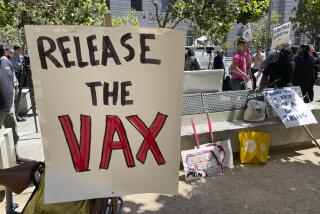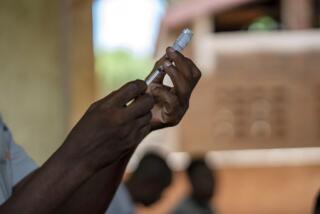Researchers in U.S. Create Ebola Vaccine for Monkeys
- Share via
WASHINGTON — U.S. government researchers said Wednesday that they had developed a vaccine that protected monkeys against the Ebola virus with a single dose -- offering a new way to stop an outbreak of the deadly disease.
The vaccine was made using a new approach that should work against a range of other viruses as well, the researchers said. And the technology might offer a quick way to develop an instant vaccine against new infections, such as SARS, or even a biological weapon.
Dr. Gary Nabel, the top vaccine expert at the National Institute of Allergy and Infectious Diseases and leader of the study, said he was surprised that a single shot of the vaccine worked.
“If we can do this for Ebola virus, I am hopeful we can apply it to other infectious outbreaks,” Nabel said in a telephone interview.
The virus, which kills between 50% and 90% of its victims though massive internal bleeding, had resisted vaccine efforts so far.
Nabel and colleagues started with a common virus called an adenovirus -- the culprit behind many cases of the common cold and some more serious infections. They added one piece of DNA from the Ebola virus -- the glycoprotein.
Traditional vaccines use a whole virus, live, killed or weakened, to help the immune system recognize the invader.
To the researchers’ surprise, monkeys given a single jab of the vaccine were 100% protected from what should have been a deadly dose of Ebola, they reported in this week’s issue of the journal Nature.
Early this year, an outbreak of Ebola killed more than 120 people in the Republic of Congo and killed many gorillas in a nearby wildlife preserve. A vaccine would be used to control such outbreaks in people and animals, Nabel said.
“This begins to change our minds about how vaccines can be used,” Nabel said. Instead of vaccinating large populations against diseases just in case, such a vaccine could be used tactically, when an outbreak starts, to control it quickly.
Nabel said the approach may be used in the development of a vaccine against SARS. Severe acute respiratory syndrome, which sickened more than 8,000 people around the world and killed more than 800, seems under control now but experts expect it could reemerge in the fall.
More to Read
Sign up for Essential California
The most important California stories and recommendations in your inbox every morning.
You may occasionally receive promotional content from the Los Angeles Times.









